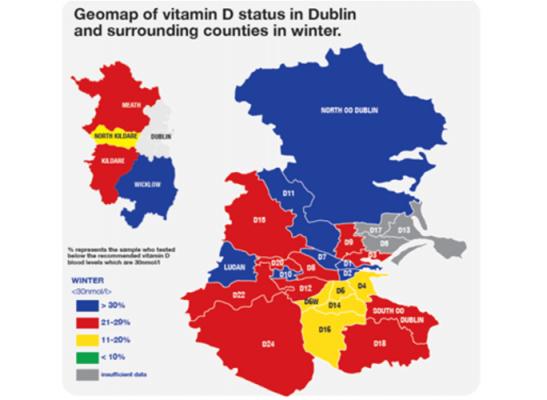
Vitamin D levels vary largely in eastern counties reveals new mapping study
Vitamin D deficiency is widespread across Dublin and surrounding counties in one of the largest studies ever carried out in Europe.
The research from the Mercer’s Institute for Successful Ageing (MISA) and Trinity College Dublin examined blood levels of vitamin D from 36,466 patients over a five year period (2014 – 2018) and found that 1 in 6 were deficient, rising to 1 in 4 in the winter.
The study was partially funded by Avonmore and builds on a longstanding collaboration between MISA and Avonmore.
Vitamin D is important as it contributes to the maintenance of bone and muscle health and helps support a healthy immune system. Using a tool known as geo-mapping, the researchers were able to create a visual map of vitamin D levels across Dublin and East Leinster.
Researchers identified large variations in vitamin D status between adults of different ages and locations. The study found that vitamin D deficiency is a problem for everyone as surprisingly, the youngest participants in the cohort (18-39 yrs category) had the lowest vitamin D levels as did those in the ‘older’ category (80+ yrs). It also found that in general men had much lower levels than women.
The prevalence of deficiency was also high in participants located in some counties within and outside Leinster.
Kildare is also showing deficiencies with average ranges of 21-29% testing below the recommended vitamin D levels. The data for Leinster (excl Dublin, Meath, Kildare and Wicklow) shows a 27% deficiency rate in winter, moving to 1 in 6 in other seasons. In addition, the sample sizes for Kilkenny and Wexford were small but deficiencies were also noted.

Dr Kevin McCarroll, study co-author and Clinical Senior Lecturer & Consultant Physician at St James’s Hospital, Dublin stated that “the study highlights how vitamin D deficiency is relatively common and affects all age groups. The striking differences in the prevalence of deficiency within Dublin and other areas is likely due to factors such as dietary vitamin D intake, supplement use, sun exposure and also ethnicity affecting the skin’s capacity to make vitamin D from sunshine. Increasing vitamin D intake in the winter when deficiency is prevalent is a good idea for many people.”
Helena Scully, Mercer Glanbia Bone Research Fellow at the School of Medicine, Trinity College Dublin and first author on the study said: “This study found lower levels of vitamin D in Irish adults than in the previous population based NANS study suggesting that vitamin D deficiency is more of an issue than once thought.
“Ensuring adequate levels of vitamin D in your diet can support bone health and normal function of your immune system. It’s also important in young adults where peak bone density isn’t reached until about the mid 20’s. Eating a balanced diet and including dietary sources of vitamin D such as oily fish like salmon and mackerel and also fortified foods such as cereals and fortified milk is important.”